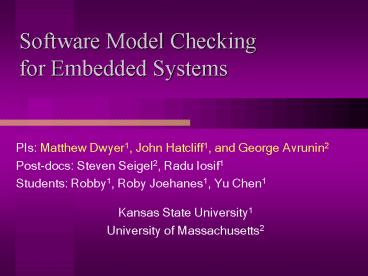Software Model Checking for Embedded Systems - PowerPoint PPT Presentation
1 / 19
Title:
Software Model Checking for Embedded Systems
Description:
The Dream. Program. Requirement. Checker. void add(Object o) ... Aggressive customization via slicing, abstract interpretation, static analysis. Java Source ... – PowerPoint PPT presentation
Number of Views:19
Avg rating:3.0/5.0
Title: Software Model Checking for Embedded Systems
1
Software Model Checking for Embedded Systems
- PIs Matthew Dwyer1, John Hatcliff1, and George
Avrunin2 - Post-docs Steven Seigel2, Radu Iosif1
- Students Robby1, Roby Joehanes1, Yu Chen1
- Kansas State University1
- University of Massachusetts2
2
The Dream
void add(Object o) bufferhead o head
(head1)size Object take()
tail(tail1)size return buffertail
Program
Checker
Property 1 Property 2
Requirement
3
Model Checking
Finite-state model
Model Checker
(F W)
Temporal logic formula
4
Why use Model Checking?
- Automatically check, e.g.,
- invariants, safety liveness properties
- absence of dead-lock and live-lock,
- complex event sequencing properties,
Between the key being inserted and the key being
removed, the ignition can be activated at most
twice.
- In contrast to testing, gives complete coverage
by exhaustively exploring all paths in system, - Its been used for years with good success in
hardware and protocol design
This suggests that model-checking can complement
existing software quality assurance techniques.
5
What makes model-checking software difficult?
Problems using existing checkers
- Model construction
- State explosion
- Property specification
- Output interpretation
6
Model Construction Problem
void add(Object o) bufferhead o head
(head1)size Object take()
tail(tail1)size return buffertail
Model Checker
Program
Model Description
- Semantic gap
Programming Languages
methods, inheritance, dynamic creation,
exceptions, etc.
Model Description Languages
automata
7
What makes model-checking software difficult?
Problems using existing checkers
- Model construction
- State explosion
- Property specification
- Output interpretation
8
Property Specification Problem
- Difficult to formalize a requirement in temporal
logic
Between the key being inserted and the key being
removed, the ignition can be activated at most
twice.
is rendered in LTL as...
((keyIn /\ ltgtkeyRem) -gt ((!activate /\
!keyRem) U (keyRem \/ ((activate /\ !keyRem)
U (keyRem \/ ((!activate /\ !keyRem) U
(keyRem \/ ((activate /\ !keyRem) U
(keyRem \/ (!activate U keyRem))))))))))
9
What makes model-checking software difficult?
Problems using existing checkers
- Model construction
- State explosion
- Property specification
- Output interpretation
10
State Explosion Problem
- Cost is exponential in the number of components
- Moores law and algorithm advances can help
- Holzmann 7 days (1980) gt 7 seconds (2000)
- Explosive growth of software limits scalability
11
What makes model-checking software difficult?
Problems using existing checkers
- Model construction
- State explosion
- Property specification
- Output interpretation
12
Output Interpretation Problem
void add(Object o) bufferhead o head
(head1)size Object take()
tail(tail1)size return buffertail
Model Description
Program
- Raw error trace may be 1000s of steps long
- Must map line listing onto model description
- Mapping to source is made difficult by
- Semantic gap clever encodings of complex
features - multiple optimizations and transformations
13
BanderaAn open tool set for model-checking Java
source code
14
Addressing the Model Construction Problem
- Numerous analyses, optimizations,two
intermediate languages, multiple back-ends - Slicing, abstract interpretation
15
Addressing the Property Specification Problem
A Java-based language for defining sequences of
program observations as instances of field-tested
specification patterns
((keyIn /\ ltgtkeyRem) -gt ((!activate /\
!keyRem) U (keyRem \/ ((activate /\ !keyRem)
U (keyRem \/ ((!activate /\ !keyRem) U
(keyRem \/ ((activate /\ !keyRem) U
(keyRem \/ (!activate U keyRem))))))))))
16
Addressing the State Explosion Problem
void add(Object o) bufferhead o head
(head1)size
Java Source
Model Descriptions
Model Compiler
- Aggressive customization via slicing, abstract
interpretation, static analysis
17
Addressing the Output Interpretation Problem
Model Description
Intermediate Representations
Model Checker
Model Compiler
Error trace
- Run error traces forwards and backwards
- Program state queried
- Locks, wait sets, blocked sets displayed
18
Goals for HCES project
- Extend model extraction technologies, e.g.,
- Exploit both code and design artifacts
- Automate generation of environments
- Automate program abstraction
- Extend property-specification formalisms, e.g.,
- Code and design-based formalisms
- Mixed state and event-based formalisms
- Multiple inter-operating formalisms
- Add time to models, environments, specifications,
and abstractions
19
Goals for HCES project
- Integrate software model checking tools, e.g.,
- Develop methodological support for applying tools
- Conduct systematic evaluation of tools
- Apply tools to embedded systems code contributed
by industrial/government partners - Develop suites of realistic multi-threaded Java
programs for tool evaluation that might serve as
community-wide challenge/demonstration problems

